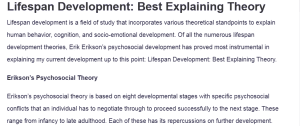Lifespan Development: Best Explaining Theory
Lifespan development is a field of study that incorporates various theoretical standpoints to explain human behavior, cognition, and socio-emotional development. Of all the numerous lifespan development theories, Erik Erikson’s psychosocial development has proved most instrumental in explaining my current development up to this point: Lifespan Development: Best Explaining Theory.
Erikson’s Psychosocial Theory
Erikson’s psychosocial theory is based on eight developmental stages with specific psychosocial conflicts that an individual has to negotiate through to proceed successfully to the next stage. These range from infancy to late adulthood. Each of these has its repercussions on further development. What interests me most in Erikson’s theory is his emphasis on social relationships and how this impacts personal growth (McLeod, 2024).
During adolescence, Erikson notes that individuals experience identity versus role confusion. In my adolescence, I remember wondering about my sense of identity, personal values, and goals. Through self-reflection and interaction with others, I slowly developed a sense of identity, a process that closely parallels Erikson’s description.
Similarly, in early adulthood, the crisis of intimacy versus isolation has also been relevant. Finding meaningful relationships has greatly affected my personal development, further proving the validity of this theory.
Comparison with Other Theories
Other theories, such as Piaget’s cognitive development or Bandura’s social learning, prove greatly helpful in gaining insight into whatever aspect of development each may specialize in. However, none brings forth the whole interplay between the social and emotional as Erikson does. Piaget’s more specific concern with cognitive stages has yielded an extremely powerful tool for tracing the development of thinking (Scott & Cogburn, 2020).
Still, it leaves out aspects of socio-emotional development, which the stages by Erikson so lucidly explore. Likewise, Bandura’s focus on observational learning references the environment but loses the developmental progression, which is integral to Erikson’s theory.
Conclusion
Erikson’s psychosocial theory perfectly suits me because it describes my developmental life course completely. This grants a coherent theoretical basis for the discussion of development and adversity through the emphasis on interpersonal relations at diverse stages of the human lifespan. From this theory, self, relationship, and societal factors are compelling and well-interpretable due to their overall framework.
References
McLeod, S. (2024, January 24). Erik Erikson’s stages of psychosocial development. ResearchGate. https://www.researchgate.net/publication/384931028_Erik_Erikson
Scott, H. K., & Cogburn, M. (2020). Piaget. PubMed; StatPearls Publishing. https://pubmed.ncbi.nlm.nih.gov/28846231/
ORDER A PLAGIARISM-FREE PAPER HERE
We’ll write everything from scratch
Question
Required Resources
Read/review the following resources for this activity:
Initial Post Option 1
- Cummings-Clay, D. (n.d.). Child developmentLinks to an external site.. Pressbooks. https://library.
achievingthedream.org/ hostoschilddevelopmenteducatio n/ - 26. Cognitive Development: The Theory of Jean Piaget
- 58. Psychosocial Development
- 65. Learning Approaches
- 91. Psychosocial Development
- Lally, M., & Valentine-French, S. (2019). Lifespan development: A psychological perspectiveLinks to an external site. (2nd ed.). Open Textbook Library. https://open.umn.edu/
opentextbooks/textbooks/ lifespan-development-a- psychological-perspective - Chapter 1: Introduction to Lifespan Development
Initial Post Instructions
For the initial post, respond to one of the following options:

Lifespan Development: Best Explaining Theory
Option 1: As you have found, lifespan development research has several renowned theorists who attempted to explain human behavior with different theories. Many people would argue that some theories explain human behavior, cognition, and socioemotional development better than others. After your review of the theories, which theory do you think best explains your development thus far and why?
Examples:
- Erikson’s theory
- Freud’s theory
- Bandura’s theory
- Piaget’s theory

